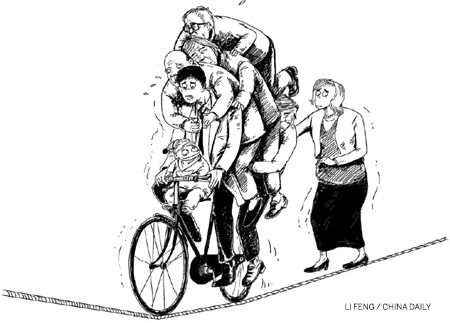Op-Ed Contributors
Debate: Aging population
(China Daily)
Updated: 2011-01-10 08:04
 |
Large Medium Small |
Jiang Xiangqun
Rural elderly at a disadvantage
The aging population in China's countryside should be treated on a priority basis when it comes to caring for senior citizens. History shows the "industrial population" benefits earlier than people engaged in agriculture from a country's facilities to help senior citizens. In fact, social security itself is the product of industrialization and the socialization of production.
About 70 percent of the people aged 60 or above in China live in the countryside, and the number of young people moving from rural to urban areas is more than 10 million a year. This means the rate of increase in the number of aging people in rural areas is worryingly faster than in urban areas. That apart, retirement or old-age social security for the young and middle-aged rural workers is also a rising concern because only about 15 percent of them have social security insurance.
The agenda of establishing and developing social security for aged people in rural areas has gained urgency in China because agricultural production has been going through the process of socialization and modernization, and elderly people are not being taken care of properly with younger members of their families having migrated to cities in search of jobs. The limits imposed by low-level traditional agricultural economic conditions and the differences in rural and urban structures have been blocking the development of a socialized security system for the aged in the countryside. This poses a great challenge
The first problem is the narrow coverage of social insurance. Less than 8 percent of the people aged between 20 and 60 are insured for old age insurance. And in the countryside, most elderly people are not part of the social security system.
The social security insurance itself is not as helpful and dependable as it should have been. The national average of old-age security pension is about 1,350 yuan ($204) a year. This amount is just enough to provide the basic necessities of life rather than being a guarantee to leading a decent life. When we consider the regional economic differences in the country, some elderly people in remote rural, less-developed areas get 200 yuan to 400 yuan a year, which is not enough to provide for even their basic necessities.
The introduction of a social security system to the countryside is a social cause, which has ironically been propelled by two contradictory factors. One, China's economic base is not strong enough to set up a social security system for aged people in the countryside. Two, a sound social security system is needed more urgently than ever in the countryside because urbanization and other factors are shrinking cultivable land, and the family planning policy has left a majority of today's senior citizens with fewer offspring to depend on, and more young people are moving from rural areas to cities for jobs.
To develop socialized services for an old-age security system is a natural outcome of a society's transformation from traditional to modern. Since about 60 percent of the country's 1.3 billion people still live in rural areas, setting up a social security system for this large group is of crucial importance for China's reform and opening-up, and modernization. China's social security system will be incomplete if it does not cover every corner of the countryside. It will be an impediment to building a well-off society, too.
The government has to shoulder the heaviest responsibility to build an all-pervasive social security system because of the backwardness of economic conditions in rural areas. First, the government has to provide the funds, even though rural social security payment should start at a relatively low level because of financial constraints and to ensure that every senior citizen is covered by the system.
Second, the setting up and development of a rural social security system for aged people should be co-launched with the handing out of family planning subsidies. Senior citizens with one offspring, and family members of revolutionaries and martyrs should be treated as special cases, and elderly people in dire straits should be provided more help.
Third, the time-honored custom of family support for old people should be strengthened, though it involves a variety of issues, such as higher payment and social welfare for rural workers, and making transportation between cities and the countryside more convenient. This will require the central government to treat the countryside on a priority basis when it comes to social and economic policies.
And fourth, since social security and services for senior citizens depend largely on local personnel, the setting up of grassroots rural organizations should be encouraged and funded to help the elderly population.
The author is an associate professor at the School of Sociology and Population Studies, Renmin University of China.
The above stories are excerpts of interviews by Mu Guangzong and Jiang Xiangqun with China Daily's He Bolin.
